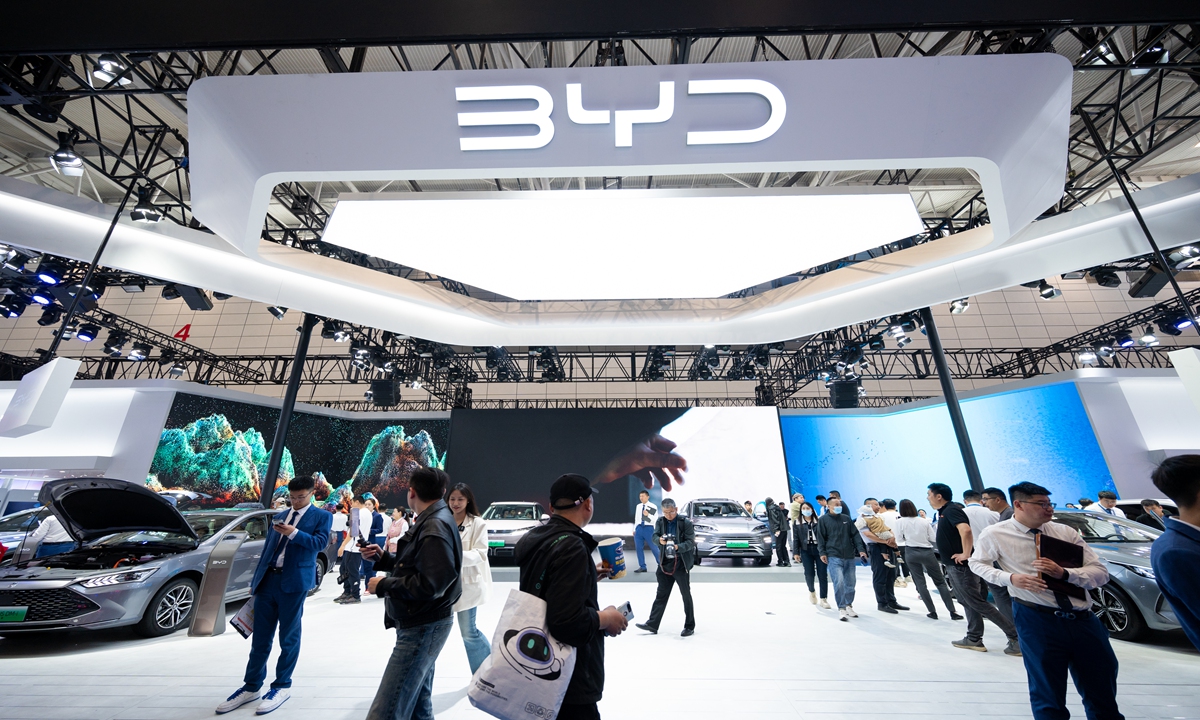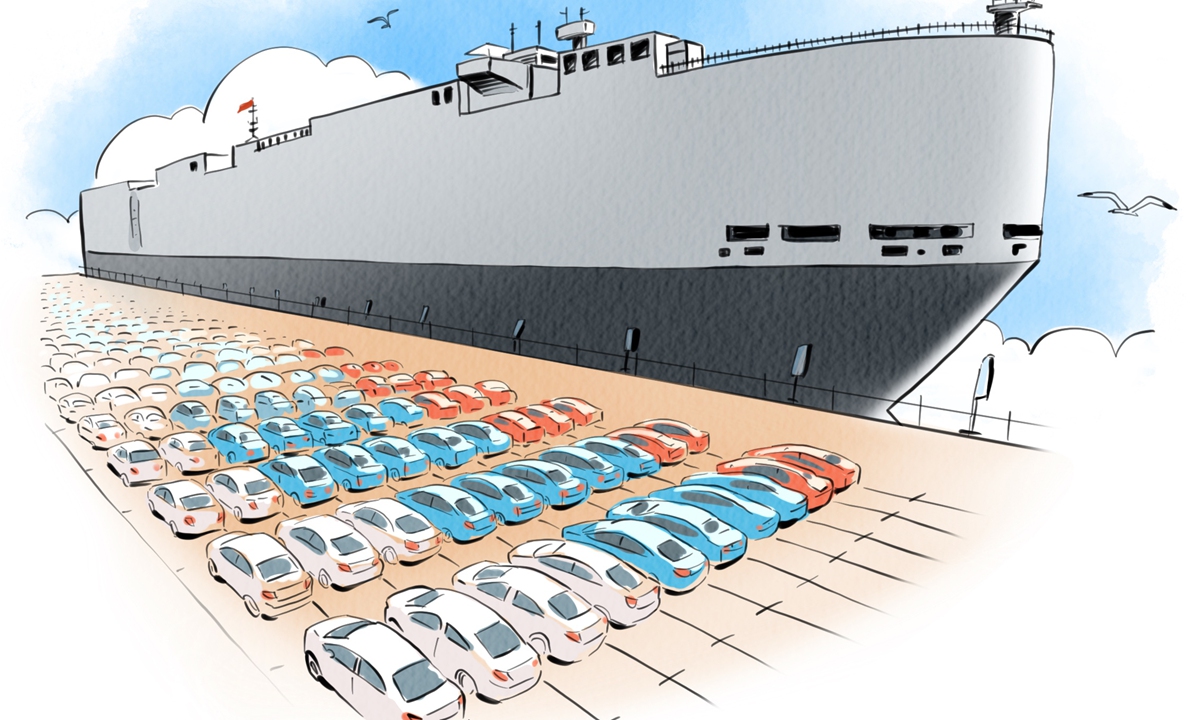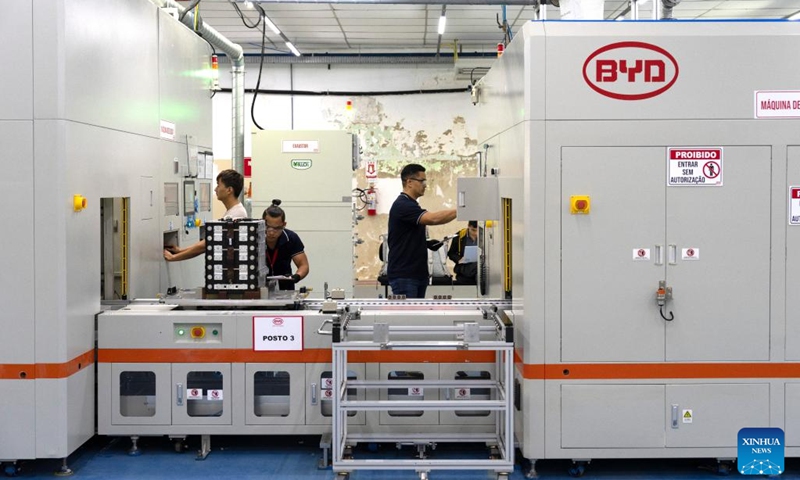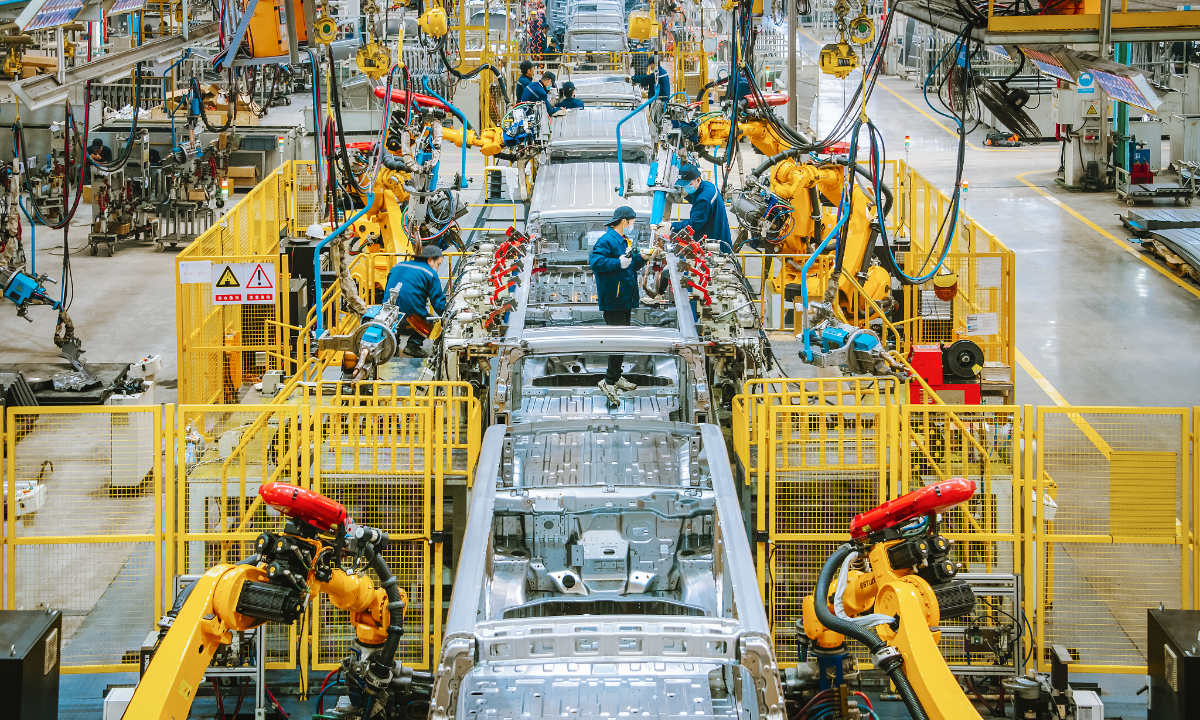BYD unveils new hybrid technology with world's lowest fuel consumption, longest range

BYD Auto's booth is seen at the 49th Qilu International Auto Show on April 11, 2024 in Jinan, East China's Shandong Province. On the previous day, the China Association of Automobile Manufacturers released the first-quarter sales and production data. Production totaled 6.606 million vehicles, up 6.4 percent year-on-year, with sales up 4.6 percent to 6.72 million. Photo: VCG
Chinese automotive giant BYD launched the latest plug-in hybrid car system on Tuesday, marking a significant advancement in fuel efficiency and cost savings. The innovation marks the "China moment" in plug-in hybrid technology, experts said.
After unveiling the new technology, BYD's A-shares rose nearly 7 percent on Wednesday, while BYD's Hong Kong shares increased by about 5 percent.
BYD has launched its fifth-generation DM-i dual-mode hybrid system in Xi'an, the capital of Northwest China's Shaanxi Province. The technology boasts the world's highest engine thermal efficiency at 46.06 percent, the lowest fuel consumption at 2.9 liters per 100 km in depleted battery mode, and the longest combined range of 2,100 km.
At the current price of 92-octane gasoline, approximately 7.4 yuan ($1.05) per liter, the cost per km for vehicle run with this system is 0.25 yuan, narrowing the gap with pure electric vehicles at about 0.16 yuan per km.
Although BYD was the first automaker to develop plug-in hybrid technology in the world, debuting its first plug-in hybrid car in 2008, it does not dominate the plug-in hybrid market alone. Since 2024, other Chinese brands have also unveiled plug-in hybrid models with ranges over 2,000 km, including Chang'an, SAIC, GAC, Chery, Geely, and Great Wall.
On May 24, Aeolus introduced the Aeolus L7, which achieved a maximum range of 2,054 km, fuel consumption of 3.8 liters per 100 km, and engine thermal efficiency of 45.18 percent. In March, Geely Auto announced its new hybrid system with a range of over 2,000 km, fuel consumption as low as 2 liters per 100 km, and thermal efficiency over 46 percent.
In addition to competing with domestic brands, BYD aims to capture more market share from joint-venture auto brands, particularly Japanese automakers like Toyota and Honda, known for their fuel efficiency. Their hybrid systems' engine thermal efficiency is around 41 percent, while BYD's fifth-generation DM engine thermal efficiency is better at 46.06 percent.
Morgan Stanley reported on Wednesday that BYD launched its fifth-generation DM hybrid technology in the Seal 06 DM-i and Qin L DM-i, each priced below 100,000 yuan, aiming to increase its market share in China.
Chinese hybrid plug-in vehicles, led by BYD, boast a competitive edge with high cost-efficiency and long running range, experts said.
In the March automotive sales rankings in the Chinese mainland market, BYD had five models in the overall top 10, with two BYD models taking the top spots, followed by the Tesla Model Y and Nissan Sylphy.
"BYD's advanced technology and market scale keep costs low, allowing seamless operation even in regions with limited charging infrastructure. This is a significant breakthrough in the global hybrid vehicle market, and BYD may further widen the gap with its competitors," Wu Shuocheng, a veteran automobile industry analyst, told the Global Times on Wednesday.
"Domestically, we are winning market share from Japanese and Korean joint ventures. Internationally, our exports are thriving, with Chinese vehicles now challenging the dominance of Japanese and Korean brands in the mid-to-low-end markets," Liu Dingding, a technology industry observer told the Global Times on Wednesday.
"Simultaneously, we are making significant inroads into the high-end segment, competing with German luxury brands like BMW, Mercedes-Benz and Audi (BBA). High-end domestic new energy vehicles (NEVs), such as Huawei's AITO series priced between 300,000 to 500,000 yuan, are winning a larger market share," Liu added.
Despite pressure from certain countries, Chinese car exports remain strong. From January to April, China exported 1.878 million vehicles, marking a 26 percent year-on-year increase. During the same period, 660,000 NEVs were exported, representing a 58 percent year-on-year increase, according to the China Passenger Car Association.
While Chinese vehicles are highly competitive and have won strong sales both domestically and internationally, they still welcome free and fair market competition, experts said.
"Thirty years ago, China attracted foreign investment to develop its automotive industry by offering access to its vast market in exchange for technology. Now, Chinese automakers can export our technology abroad. In the future, more foreign car manufacturers will seek partnerships with us," said Wu.
"For example, Huawei's intelligent driving system is not limited to the AITO series; it could potentially be used by BBA as well. If foreign brands adopt an open and cooperative attitude for a win-win outcome, China's automakers could join hands with international manufacturers for joint development, driving global industry upgrades and accelerating the transition to an era of electrification and intelligence," Liu said.
"Demand for Chinese NEVs are booming both domestically and in Southeast Asia. Some Western voices say we have 'overcapacity', partly due to their inadequate infrastructure and protectionism. Regardless, we will continue to develop NEV technology suited to our needs," Wu added.



